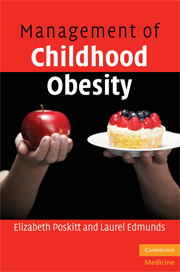Book contents
- Frontmatter
- Contents
- Foreword by David W. Haslam
- Preface
- Acknowledgements
- List of abbreviations
- 1 Introduction
- 2 How fat is fat? Measuring and defining overweight and obesity
- 3 Where should overweight/obese children be managed?
- 4 How do we approach the overweight/obese child and family?
- 5 The clinical assessment: what are the special points?
- 6 What complications should we look for now and later?
- 7 How does psychology influence management?
- 8 Management: what do we mean by lifestyle changes?
- 9 How can we reduce energy intake?
- 10 How can we increase energy expenditure?
- 11 What else can be done?
- 12 How can we sustain healthy weight management?
- 13 What can we do to prevent childhood overweight and obesity?
- References
- Index
12 - How can we sustain healthy weight management?
Published online by Cambridge University Press: 08 August 2009
- Frontmatter
- Contents
- Foreword by David W. Haslam
- Preface
- Acknowledgements
- List of abbreviations
- 1 Introduction
- 2 How fat is fat? Measuring and defining overweight and obesity
- 3 Where should overweight/obese children be managed?
- 4 How do we approach the overweight/obese child and family?
- 5 The clinical assessment: what are the special points?
- 6 What complications should we look for now and later?
- 7 How does psychology influence management?
- 8 Management: what do we mean by lifestyle changes?
- 9 How can we reduce energy intake?
- 10 How can we increase energy expenditure?
- 11 What else can be done?
- 12 How can we sustain healthy weight management?
- 13 What can we do to prevent childhood overweight and obesity?
- References
- Index
Summary
One of the problems for those obese and overweight who manage to control their weight successfully is preventing the gradual (or rapid) return to previous overweight. As children grow up and develop physiologically and psychologically, lifestyle changes may become embedded with the consequences that weight status may be easier to maintain than for adults adapting to modifications of already entrenched lifestyles. Many obese and overweight children do continue as obese and overweight adults but the correlation between obesity in childhood and in adult life is greatest when the time between the two assessments is short. As a generalization, the younger the child or the further from childhood the adult is, the lower the correlation between overweight/obesity in childhood and in adult life. As childhood and adult overweight and obesity become increasingly common, the chances of an overweight or obese child remaining overweight or obese as an adult will increase since overweight adults are unlikely to come equally from children of all weight states. Even so, the majority of obese adults were normal weight children and a significant proportion of overweight children do slim down either before the end of childhood or in adult life.
If we are to build on change which may occur naturally anyway, the processes of achieving sustainable normal BMI or significant loss of fat require considerable time. Children and families seeking help for weight problems usually have initial enthusiasm to act but rarely recognize how slow the process of ‘slimming’ can be.
- Type
- Chapter
- Information
- Management of Childhood Obesity , pp. 161 - 167Publisher: Cambridge University PressPrint publication year: 2008



